Online gambling: Are Ugandans hooked?
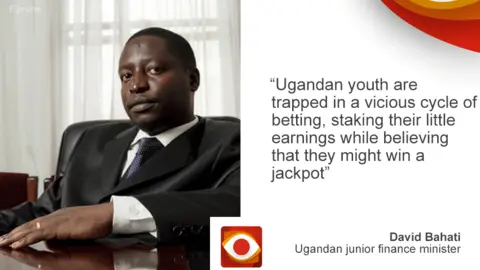 BBC
BBCGambling is on the rise in East Africa - by phone, by computer and in betting shops. It's big business and it's generating much needed tax revenue for the government.
But there are growing concerns in Uganda over the social impact.
New controls on the industry have been announced by the government, aimed at restricting the activities of foreign betting companies.
"Ugandan youth are trapped in a vicious cycle of betting, staking their little earnings while believing that they might win a jackpot," said Junior Finance Minister David Bahati, speaking at an event on behalf of President Yoweri Museveni.
"From now on, no new companies are going to be licensed. Those which are already registered [will receive] no renewal of licences when they expire."
So is it true that the youth are the ones who bet most and is there a growing problem of heavy gambling?
The rise of gambling in East Africa
Over the past few years, new betting companies have been launched across the East African region.
Much of the gambling is conducted through mobile phones, with English Premier League football being a popular choice.
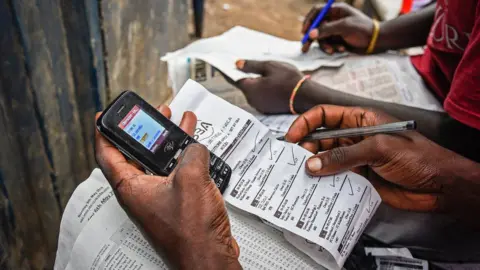 Getty Images
Getty ImagesGovernments have encouraged these new companies, which generate significant tax revenues and invest in local football leagues.
But President Museveni, who was initially very encouraging to the fledging betting companies, is now starting to express his reservations.
He is particularly concerned about foreign-owned companies repatriating profits rather than re-investing them in Uganda.
"All they do is accumulate money from Ugandans, then ship it out of the country," he said.
Questioned in parliament about the presence of foreign-owned betting companies, Mr Bahati said: "Looking at the way limited space will be given, only Ugandan companies will be allowed."
Allow X content?
Are the young gambling more?
A recent study conducted in the Ugandan capital, Kampala, found evidence that many who took part in gambling did so as a source of livelihood rather than as a leisure activity.
The study, by the Economic Policy Research Centre, suggested about 45% male Ugandans in the 18-30 age group engaged in some form of gambling, compared with about a quarter of all adults.
This research also found that "those who gamble to escape poverty are more likely to get addicted than those who do it for leisure".
It is, according to the EPRC, an overwhelmingly male activity, with less than 4% of female respondents to the survey saying they'd participated in sports betting.
The report also estimated that those who gambled spent about 12% of their monthly income on gambling activities.
"The desire to make quick easy money from gambling is driving the youth into gambling to the extent that some look at gambling as a source of livelihood in lieu of undertaking jobs that may require substantial time, mental and physical commitments," the researchers said.
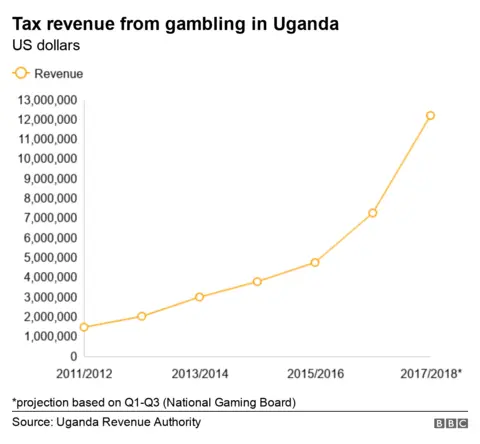
Tax revenue on the rise
The rapid increase over the past few years in tax revenue from the gambling industry is a clear measure of the rise in betting among Ugandans.
Over the past four years (up to 2017-18), the government's data suggests a more than four-fold increase in revenues.
If the Ugandan government follows through with its plans to curb gambling, it will clearly have an impact on these revenues.
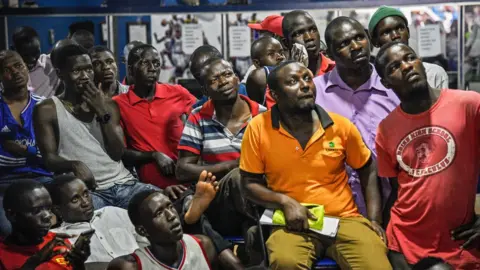 Getty Images
Getty ImagesSome have expressed surprise that the government has taken this step given the benefits it now receives from the gambling industry.
"I thought the financial incentive for the government may have been too high," says Sylvan Herskowitz, a development economist who has looked at the issue in Uganda, "even though people had been voicing concerns about the negative effects of betting."
What are the social concerns?
Criticism levelled at the gambling industry has been growing, with accusations that it is affecting young lives not only in Uganda but across the region.
Mr Herskowitz says: "It's a major issue facing youth, especially those with limited financial [resources]."
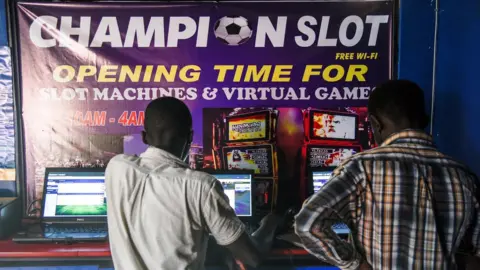 Getty Images
Getty ImagesA sports betting official at Galz Betting in Kampala, Patrick Lubaale, points out that many thousands of people depend for employment on the industry.
And betting companies, he says, have been campaigning for responsible betting.
"If the president [Museveni] is complaining about the negative effects on young people," says Mr Lubaale, "we have already been sensitising the public about the irresponsible betting and people are aware about this - but this should not be reason to ban the trade."
But the issue of heavy gambling among those least able to afford to lose money is increasingly being raised in Uganda.
Finance Minister Matia Kasaija has called for moderation.
"If the youth are concentrating on gambling, it's very unfortunate," he says.
"You are going to get in trouble. You will run out of money. You will not have what to eat. You will have nowhere to sleep. The next thing is now start to pick-pocketing."
However, despite the government commitment not to renew their licences, there has as yet been no clear indication which betting companies operating in Uganda this will affect and when.


